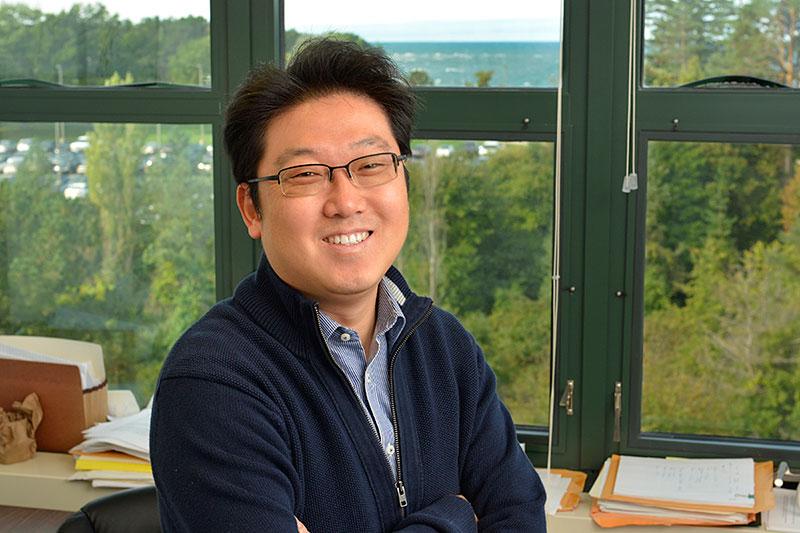New home—Fulbright Scholar Chong Jin Oh, a professor from Hankuk University of Foreign Studies in Seoul, makes SUNY Oswego’s Mahar Hall his academic home and the city his family’s home for his 10 months as a Fulbright Visiting Scholar. The well-traveled international relations researcher has lived in seven countries and visited 35 … and has found Oswego “charming” and full of good scholars.
Dr. Chong-Jin Oh chose to come from the Republic of Korea to SUNY Oswego for his 10-month Fulbright Visiting Scholar experience, thanks to an academic colleague of long acquaintance, the beautiful residential campus and Oswego’s strong relationship with his home university, he said.
“After getting the Fulbright grant, I had a lot of opportunities in the United States,” said Oh, a professor of international relations at Hankuk University of Foreign Studies in Seoul and an expert in Turkic cultures and politics. “I was in contact with Princeton, Wisconsin at Madison and one (university) in Texas.”
Oswego had an important edge: Oh earned his doctorate at Bilkent University in Turkey, at the same time Dr. Murat Yasar, now of Oswego’s history department, was pursuing his master’s degree there. Both were studying the Turkic Muslim world in Central Asia, taking some of the same classes and attending the same seminars.
“We were debating Uzbek-Kazakh issues,” Oh said. They became friends.
The two have kept up a correspondence, and Yasar persuaded him that the library resources, residential campus, natural surroundings and other features of SUNY Oswego and the community would give Oh a good base for his Fulbright Scholarship and an excellent break from his urban campus in Seoul.
As an additional motivator, SUNY Oswego recently completed an agreement with HUFS that sent dozens of students here, and is in negotiations on a new academic relationship.
“SUNY Oswego has been a close partner of my institution, HUFS. We have been cooperating very good the last four years,” Oh said.
Oswego immersion
The highly competitive Fulbright Scholar grants promote international education exchange and research to foster mutual understanding between the United States and other countries.
Chair of HUFS’ interdisciplinary department of Turkish-Azerbaijani studies, Oh said his primary research goal is trilateral cooperation among Turkey, Korea and the United States, from a historical perspective all the way to the contemporary international agenda.
Oh has made friends among other faculty members in Mahar Hall in the humanities, economics, history and psychology.
“There are good scholars here,” he said. “And I think the location is charming. I’m coming from concrete villages and a big city—Seoul is about 15 million people.”
Oh’s wife and 10-year-old daughter moved here and are immersing themselves in Oswego life. Weekend travels have taken them to Beaver Lake, Fair Haven Beach, Mexico and Pulaski. Oh has lived in seven different countries and visited 35, and believes strongly in adapting himself fully to local culture and society.
For his Fulbright, Oh expects to travel to New York City and elsewhere as needed.
“I come from international relations,” he said. “I do lots of interdisciplinary work combining history and sociology. Most of my works are from a political science perspective. I can do much from the desk and the computer, but I do also research in the field, interview people, make surveys. Sometimes I do my research based on some of period of observation and interaction. My past experiences of living abroad definitely helped me a lot.”
Some of Oh’s past research has dealt with diaspora and migration across Turkey, Central Asia and the Middle East, an issue that has made global headlines resulting from Syria’s civil war. Turkey has taken in the most Syrian refugees—more than 1 million since 2011.
“There are a lot of language and cultural similarities between Turkic nations and Korea,” Oh said, and key U.S. allies such as Turkey and Korea, and other countries across Central Asia, serve as a good balance to Russia’s and China’s interests.




